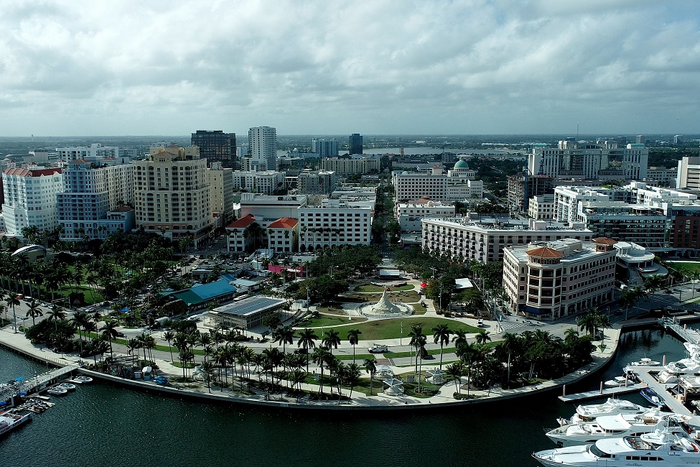
Florida Atlantic University’s Institute for Sensing and Embedded Network Systems Engineering and its College of Engineering and Computer Science have landed a $26 million award from the National Science Foundation’s flagship engineering program to catalyze convergent research to address large-scale societal challenges.
The Center for Smart Streetscapes (CS3) will be supported for five years. Streetscapes are sites for deploying engineering research. A “smart streetscape” can sense human behavior and guide disabled pedestrians, collect refuse, control pests, amplify emergency services, and protect people against environmental and health threats.
“We are thrilled to receive this ERC award with our partners,” said FAU President John Kelly in a statement. “CS3 will provide important pathways for universities, government, industry, and community stakeholders to collaboratively improve quality of life, enhance social equity, and stimulate economic development through innovative and cutting-edge smart city technologies.”
According to the press release, Florida Atlantic University (FAU) will manage the new engineering research center (ERC) in collaboration with Columbia University, Rutgers University, the University of Central Florida, and Lehman College.
“Together with Columbia University and our other core partners, FAU will co-lead smart city research and innovation, capitalizing on and growing our collective experience in sensing technologies, artificial intelligence, high-speed wireless communication, simulation, and forecasting, among other areas of expertise,” said Stella Batalama, Ph.D., dean, FAU College of Engineering and Computer Science. “Joining forces with our academic, government, and industry partners will help to ensure the rapid translation of these technologies for wide-use applications and fruitful economic impact.”
The nation’s streetscapes – neighborhood streets, sidewalks, and public spaces – define the character of American communities, linking people with social and commercial institutions, and bonding people across demographic identities.
CS3’s mission is to advance livable, safe, and inclusive communities through new streetscape applications built upon real-time and hyper-local streetscape intelligence. This will require fundamental engineering advancements in wireless/optical communications, edge/cloud computing, situational awareness, and privacy and security while balancing public sphere data collection requirements with community-defined benefits.
CS3 will apply these advancements across road safety & traffic efficiency; public safety; assistive technologies; the future of outdoor work; and hyper-local environments.
The applications will be realized within urban environments, leveraging strong partnerships with community organizations and municipal agencies in Harlem, New York City; West Palm Beach, Florida; and New Brunswick, New Jersey.
At FAU, CS3 builds upon a longstanding partnership with the City of West Palm Beach, developed through the West Palm Beach Mobility Intelligence Project, led by FAU’s Institute for Sensing and Embedded Network Systems Engineering (I-SENSE).
Launched in 2019, and supported by the City of West Palm Beach, the Knight Foundation, and the Community Foundation of Palm Beach and Martin Counties, the pedestrian mobility sensing project plays a central role in CS3.
“Over the next decade, CS3 will bring a range of smart streetscape technologies to the City of West Palm Beach and position the city as a national leader in smart cities,” said West Palm Beach Mayor Keith A. James. “These technologies will enable new streetscape applications designed to enhance livability, safety, and inclusivity across the West Palm Beach community – from enabling safer crosswalks, to improving transportation and parking, to assisting pedestrians with disabilities. The applications to be developed will be selected and guided through continuous public engagement.”
The FAU team led by I-SENSE and the College of Engineering and Computer Science comprises researchers, staff, and students across the FAU community, including FAU’s Dorothy F. Schmidt College of Arts and Letters, Charles E. Schmidt College of Science, the Office of Undergraduate Research and Inquiry, and the Office of Equity and Inclusion.
“This prestigious award is Florida Atlantic University’s first designation as a National Science Foundation Engineering Research Center. It marks a significant milestone for I-SENSE, the College of Engineering and Computer Science, and our entire university,” said Daniel C. Flynn, Ph.D., FAU vice president for research. “The interdisciplinary nature of the project will serve as a catalyst for important scientific and technological advancements that will transform cities throughout our nation.”
The ERC for Smart Streetscapes positions academic and non-academic stakeholders – urban residents, institutional leaders, students, teachers, and municipal resource managers – as co-producers of knowledge and auditors of technology research and development, forming a broad innovation ecosystem that explores the science, utility, and humanity of engineering research.
The U.S. Army Corps of Engineers has been tasked with…
Brown and Caldwell, a leading environmental engineering and construction firm,…
Humboldt State University, one of four campuses within the California…